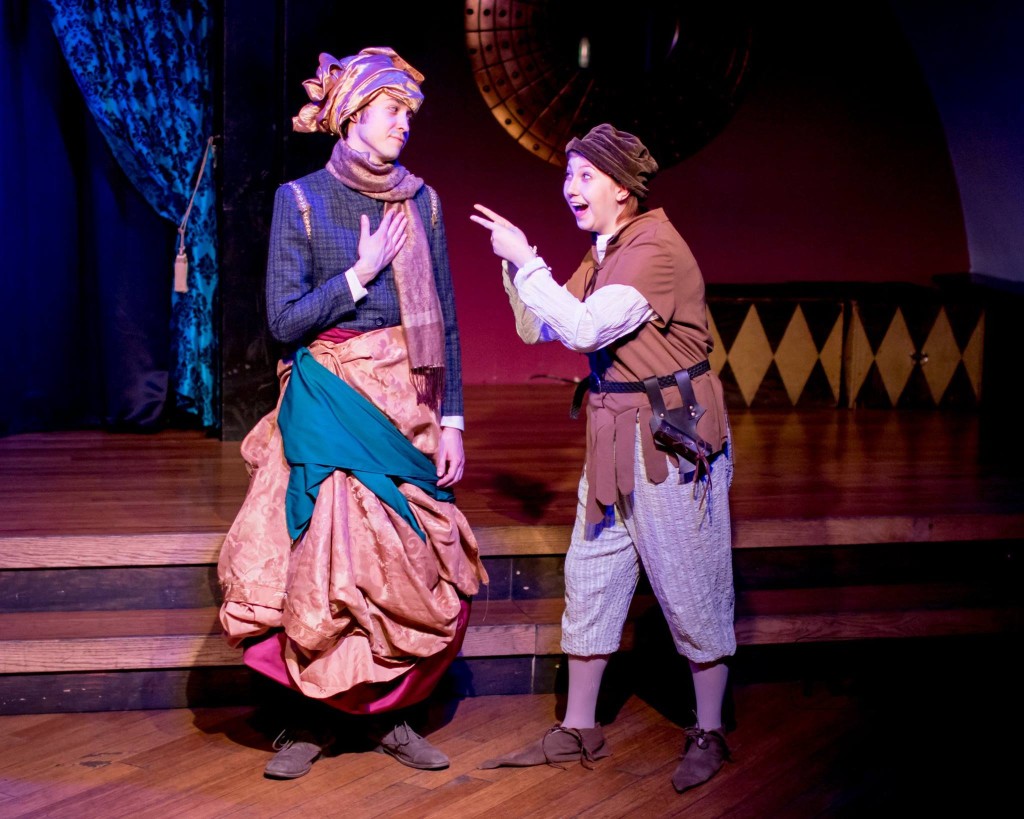
Pinne (Katy Jenkins) playfully mocks Julian (Adrian Garcia) for acting ‘above his station’ in Act 4, Scene 3 of The Wayward Women
It is my habit, when writing a play, to put my own opinions in the mouths of low-ranking characters whom few people respect. When possible, I also like to make sure those characters are hypocrites and/or undercut at some point. I think I picked up this desire after reading Candide, wherein everyone’s principles are inevitably disproved, even the perpetual pessimist Martin. In fact, the undercutting of all spoken principles is arguably the theme of The Wayward Women.
This is particularly evident in Julian and Pinne, two of the more sympathetic characters in The Wayward Women. Julian sets himself up from the get-go as a victim of fate and sees little point in trying to “take arms against a sea of troubles.” His very first words in the play council his master Cordelius to float along on the river of life and stop trying to take control of anything. This, of course, does not stop Julian from complaining when fate deals him an uncharitable hand, nor does it stop him from subtle attempts to take advantage when fortune throws a bone his way.
Like many “nice guys,” Julian turns hypocrite when a beautiful woman enters his concerns. In 4.3 (above), Julian protests the cruelty of chance in denying him Aquiline’s love. Pinne, meanwhile, tries to gently explain that despite her superior intelligence and occasional moral qualms, Aquiline is every bit as superficial and vacuous as Cordelius. Showing a level of perception surpassing everyone else in Amosa, Pinne suggests that the morals which govern “less important” people like Julian and herself are not the same morals by which “the greater people” live their lives. “The Angels are for Angels, and we eat scraps,” she says.
Pinne, in fact, may well be the only character in The Wayward Women with a clear development arc. She begins the play a stuttering collection of malapropisms, too nervous to speak and frequently bullied into silence by both Dame Grendela and her own mistress, Dame Anu. Yet by the play’s end, she is the most articulate, aware, and perhaps even the most assertive and mature character to be found.
Only two characters unequivocally get what they want in The Wayward Women: Cordelius (after surrendering all agency in his own life, as Julian preaches but seems unable to do himself), and Pinne, who wants only to sing. The Wayward Women seems to be telling us that we can either surrender to chance entirely or resign ourselves to small and seemingly insignificant victories. On the other hand, to go from an inarticulate mess to a powerfully-spoken arbiter in the space of a day is maybe not so insignificant a victory in the eyes of the achiever.
PS, ALMOST FORGOT. Pinne is a particularly impressive sign of the intuitive genius of costume designer Delena Bradley. Although I provided several ‘inspirational’ images associated with each character, there was nothing for Pinne so similar to Wart from Sword in the Stone. And yet, as soon as I saw Katy in this costume, I immediately thought… “That is Pinne. Per-fection.” And I am physically in love with those shoes.
COSTUMES by Delena Bradley
LIGHTING by Benjamin Dionysus
PHOTO by iNDie Grant Productions
